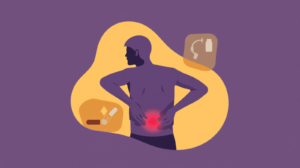Back pain is something many of us deal with at some point. Whether it’s a nagging ache after a long day or a more serious, ongoing problem, it can really get in the way of living comfortably. While doctors and therapists can help, there’s a powerful tool you might already have in your kitchen: food. Eating the right anti-inflammatory foods can ease pain and help your body heal naturally. Let’s dive into how inflammation affects back pain and what you can eat to feel better.
Understanding the Link Between Inflammation and Back Pain
What Causes Inflammation in the Body?
Inflammation is your body’s way of protecting itself. When you get injured or sick, it kicks in to heal damaged tissue. That’s a good thing! But sometimes, inflammation sticks around longer than it should, this is called chronic inflammation. It can happen because of things like stress, a poor diet, or even just aging. When inflammation becomes chronic, it can actually start to cause problems instead of fixing them.
How Inflammation Contributes to Chronic Back Pain?
When your back hurts for a long time, inflammation might be part of the reason. It can irritate nerves and make muscles and tissues around your spine swollen and stiff. This creates a frustrating cycle where pain causes inflammation and inflammation makes the pain worse. The good news? Reducing inflammation with food can help break that cycle and ease your back pain.
Top Anti-Inflammatory Foods for Back Pain Relief
1. Fatty Fish (Salmon, Mackerel, Sardines)
These fish are packed with omega-3 fatty acids, which are like little warriors that fight inflammation in your body. Including fatty fish in your diet can help reduce joint pain and make your muscles feel less stiff.
2. Leafy Greens (Spinach, Kale, Collard Greens)
Leafy greens are nutritional powerhouses full of antioxidants and vitamins that help calm inflammation. Plus, they’re high in fiber, which supports your gut health and a healthy gut means less inflammation overall.
3. Berries (Blueberries, Strawberries, Raspberries)
Berries don’t just taste great, they’re loaded with antioxidants that protect your cells and keep inflammation in check. They also have vitamin C, which helps repair tissues and keep you feeling strong.
4. Turmeric and Ginger
If you like spices, you’re in luck! Turmeric and ginger have been used for centuries to ease pain and swelling. Turmeric’s main ingredient, curcumin, is especially powerful at calming inflammation, while ginger helps relax your muscles and reduce discomfort.
5. Nuts and Seeds (Almonds, Walnuts, Chia Seeds)
These small but mighty foods bring healthy fats and antioxidants to the table. Walnuts and chia seeds are great sources of omega-3s too, which help reduce inflammation and support joint health.
6. Olive Oil and Avocados
Think of olive oil and avocados as delicious and heart-healthy fats that also fight inflammation. Extra virgin olive oil has compounds that work similarly to anti-inflammatory medicine, while avocados provide vitamins and healthy fats that protect your joints.
7. Green Tea
Green tea is a soothing drink loaded with antioxidants called polyphenols. These help lower inflammation and may even protect the cartilage in your joints, keeping your back healthier.
Foods to Avoid That May Trigger Inflammation
1. Refined Carbohydrates and Sugars
Foods like white bread, pastries, and sugary drinks cause blood sugar spikes that can trigger inflammation. They might taste good, but they can make your back pain worse.
2. Processed Meats and Red Meat
These are often high in saturated fats and other compounds that promote inflammation and oxidative stress, which isn’t great if you’re trying to ease pain.
3. Trans Fats and Fried Foods
Found in many fast foods and packaged snacks, trans fats are notorious for increasing inflammation and hurting your heart health too.
4. Excessive Alcohol and Caffeine
Having a drink or coffee now and then is usually okay, but too much alcohol can upset your gut and immune system, leading to more inflammation. Too much caffeine can also make muscles tense and painful.
Building an Anti-Inflammatory Meal Plan
Sample One-Day Meal Plan
Here’s a simple way to get started with anti-inflammatory eating:
- Breakfast: Warm oatmeal topped with fresh blueberries, chia seeds, and a little honey
- Lunch: Grilled salmon salad with spinach, kale, avocado, and a drizzle of olive oil
- Snack: A handful of walnuts with a cup of green tea
- Dinner: Stir-fried veggies with turmeric and ginger, served with quinoa
Tips for Shopping and Meal Prep
- Pick fresh, whole foods instead of processed snacks
- Shop seasonal produce for better taste and nutrients
- Cook in batches so you always have healthy meals ready
- Don’t be shy with spices like turmeric and ginger—they add flavor and healing benefits!
Lifestyle Tips to Complement an Anti-Inflammatory Diet
- Keep a healthy weight to reduce stress on your back
- Drink plenty of water to keep your joints lubricated
- Move regularly with gentle exercises like walking, yoga, or swimming
- Manage stress with mindfulness or relaxation techniques, since stress can make inflammation worse
When to See a Doctor About Back Pain?
If your back pain is very intense, lasts more than a few weeks, or comes with symptoms like numbness or weakness, it’s important to get checked out by a doctor. While food and lifestyle changes help a lot, some conditions need professional care.
Conclusion
Changing what you eat can be a simple but powerful step toward easing back pain. Filling your plate with anti-inflammatory foods while avoiding those that trigger inflammation can help your body heal naturally. Pair that with healthy habits, and you’re giving your back the best chance to feel better, day by day.
Frequently Asked Questions
1. Can diet really help reduce chronic back pain?
Absolutely. Eating foods that fight inflammation can help reduce the pain and stiffness that come with chronic back issues.
2. How does inflammation cause back pain?
Inflammation makes your spinal tissues swollen and irritated, which leads to pain and stiffness.
3. Is turmeric effective in relieving back pain?
Many people find turmeric helpful because of its curcumin content, which naturally calms inflammation and pain.
4. Can dehydration make back pain worse?
Yes, staying hydrated keeps your spinal discs healthy and helps prevent stiffness that can worsen pain.























